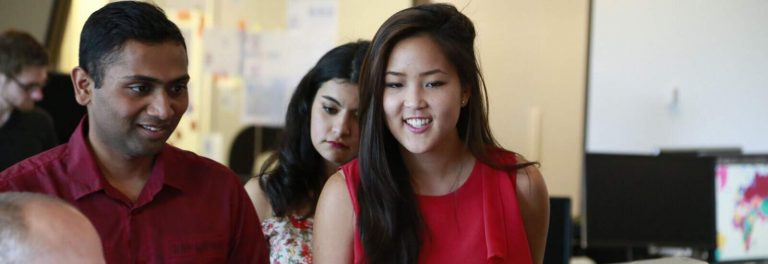Microsoft has taken the opportunity today to show off the team behind not Cortana itself, but specifically Cortana’s personality. The group behind Cortana’s wittiness consist of newly graduated students that are apparently paid just to find ways to make people laugh.
Cortana, the Halo-inspired digital assistant launched on Windows Phone last year and on Windows 10 this year to help people be more productive with their lives. The assistant can be accessed from the click of a button or from the sound of your voice.
Cortana is not just a series of rehearsed responses. Cortana was designed to have an actual personality. This can be found in the various minutiae of how Cortana presents itself: the slick bouncing and spinning circle animation. Cortana’s uses melodic, Jen Taylor sourced (in the US at least) voice as well. Clearly the team of newly grads is doing a good job, as 14 percent of Cortana interactions with consumers are conversational; non-functional in nature.
That’s where the Cortana personality team comes in.
Project Manager Mouni “Reddy” Reddi, “the chitchat PM”, grew up in India and has a master’s degree in human factors and ergonomics from Penn State. He puts his education to use by analyzing and directing how Cortana handles various conversational scenarios. It’s also worth noting that he’s an avid Windows Phone fan. His first encounter with the mobile OS prompted him to apply for any available job within the Windows Phone team. He was stunned when he was hired not only to work on Windows Phone, but in what could very well be the most important feature to come out of any Windows mobile offering.
They believed in me. I think that is something that’s really motivated me — both the accountability and the amount of trust they put in me. This will be Microsoft’s marquee feature, and you will be in charge of one of the major components.”
August Niehaus is one of five content developers on the Cortana editorial team for US users. She and her colleagues try to deduce the intent behind a non-functional question, and craft appropriate responses for as many situations as conceivable. Niehaus states that the most important aspect of the response is that it has to be intelligent. She says she’s pinching herself every day, as she still feels in a dreamlike state to be working around so many talented, passionate, and fun-loving people.
“I cannot stress how awesome it is to be in a room with writers with just an insane amount of wit. To play off of them, to throw my idea out there and have it ping-pong around the room and get funnier and funnier as it goes… we’ll just sit there and tickle our own funny bones.”
Lim, a former Google intern, grew up in the San Francisco Bay Area, majored in computer science and cognitive science at the University of California, Berkeley, is really enjoying her stay in the Redmond campus. When she eventually became a Microsoft intern, she emphasizes that she was given great responsibility. “The level of responsibility and trust Microsoft puts in interns is pretty phenomenal,” she says. One of her first projects on the Cortana team was working on the very useful flight tracking feature. After her stellar work, when given the option to choose what to work on next, she chose Cortana’s personality, as she felt it fit her cognitive science studies. She is now program manager.[pullquote align=”right” cite=”” link=”” color=”” class=”” size=””]The level of responsibility and trust Microsoft puts in interns is pretty phenomenal[/pullquote]
Last but not least, Content Editorial Manager Jonathan Foster leads the team that writes Cortana’s responses. He says it’s very exciting to be part of the personality team, as personality in technology is the hot new thing now. He emphasizes that work at Microsoft is brimming with opportunities.
The world here is rich. There are going to be a lot more cool projects, just because of the direction we’re going, and because technology is demanding cool projects.
Unlike many other teams at Microsoft, the Cortana personality team’s focus is not necessarily mathematical engineering, but human understanding. This requires a team not just of competent thinkers, but of jovial fellows capable of translating the human experience to something a software algorithm can understand and process. Microsoft clearly understands this.
That the team is comprised of educated, ambitious, clever, and witty people from all sorts of backgrounds and cultures who clearly love working with each other speaks volumes to why and how Cortana stands out as a cutting edge digital assistant.




